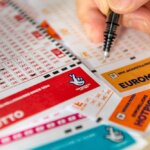The National Lottery, familiarly known as Lottery UK, stands as a pivotal element of the gambling landscape in the United Kingdom. Established in 1994, it has since become a cornerstone of both British popular culture and benevolent contributions to society. It operates on the principle of a random draw, where participants select numbers in the hope of matching them with those produced during the draw to win varying prizes.
The allure of the lottery is not only in the potential of winning large sums of money but also in its significant contribution to national causes. A sizeable portion of the funds raised through ticket sales is allocated to support projects in the arts, sports, heritage, and community segments across the UK. This function positions the lottery as an instrument of societal benefit, as well as individual gain.
Lottery UK encompasses a diverse range of games, including Lotto, EuroMillions, and Thunderball, among others. Each game comes with its own set of rules and prize structures, offering players multiple ways to engage and win. As lottery games evolve, they continue to captivate the nation’s imagination and evoke a sense of communal hope and excitement.
History of the UK Lottery
The UK Lottery, officially known as The National Lottery, was established in 1994. It has since become an iconic part of British culture, with millions participating weekly.
Origins and Launch
The National Lottery was created following the government’s decision to establish a national lottery with the intent to raise funds for various social and cultural causes. The first draw took place on 19 November 1994, with the show beamed live on BBC One. Seven jackpots were won in this inaugural draw.
Evolution Over the Years
Since its inception, the UK Lottery has undergone several changes to keep the games fresh and increase the chances of winning something. For instance, in 1997, the Lottery introduced Wednesday evening draws, adding another opportunity to play. In October 2015, 10 more numbers were added to the pool for the main Lotto game, extending the total number of balls from 49 to 59.
Multiple games have been introduced, such as EuroMillions in 2004 and Set For Life in 2019. The Lottery also expanded online, offering players the convenience of buying tickets digitally. As the lottery evolved, the size of jackpots increased, making the potential winnings even more lucrative for participants.
How the UK Lottery Works
The UK Lottery comprises a variety of game formats, each with distinct rules and prize structures. Players can purchase tickets through multiple methods and should be aware of the regular schedule for drawings.
Game Formats
The UK Lottery offers several game formats including Lotto, EuroMillions, and Set For Life. Lotto operates on a 6/59 number system where players choose six numbers, and prizes are awarded for matching at least two main numbers. EuroMillions is a transnational lottery requiring players to select five main numbers from 1 to 50 and two Lucky Stars from 1 to 12, with bigger jackpots on offer. Set For Life gives players a chance to win fixed payments over a set number of years by matching five main numbers and a Life Ball.
- Lotto: 6/59 format; Wednesday and Saturday
- EuroMillions: 5 main numbers + 2 Lucky Stars; Tuesday and Friday
- Set For Life: Fixed annuity prize; Monday and Thursday
Ticket Purchase Methods
Tickets for the UK Lottery can be purchased either in person at authorised retailers or online via the official National Lottery website or mobile app. Online purchase options include:
- Single Purchase: Buying tickets for individual draws.
- Direct Debit: Automatically enters players into their choice of consecutive draws.
| Purchase Type | Description |
|---|---|
| Single | One-off entry for selected draws. |
| Direct Debit | Recurring entry for multiple consecutive draws. |
Drawing Schedule
Drawings for UK Lottery games occur throughout the week:
- Lotto: Draws take place every Wednesday and Saturday evening at 7:45 PM GMT/BST.
- EuroMillions: Drawings are on Tuesday and Friday nights at approximately 8:45 PM GMT/BST.
- Set For Life: This game has its drawings on Monday and Thursday evenings at 8:00 PM GMT/BST.
Regular participation in these drawings aligns with the respective rules and cut-off times for ticket purchase.
Odds of Winning
The likelihood of winning the lottery varies by game, with substantial differences in the odds based on the play structure and prize tiers.
Statistics and Likelihood
In the UK National Lottery’s Lotto game, the odds of winning the jackpot by matching all six numbers are 1 in 45,057,474. The chance improves modestly when looking at lower prize tiers, such as 1 in 7 for the smallest prize of a free Lucky Dip. Here’s a breakdown of the odds for winning different prizes in the Lotto:
- Jackpot (Match 6): 1 in 45,057,474
- 5 numbers + Bonus Ball: 1 in 7,509,579
- 5 numbers: 1 in 144,415
- 4 numbers: 1 in 2,180
- 3 numbers: 1 in 97
- 2 numbers: 1 in 10.3
For EuroMillions, which is a multi-national lottery, the odds of hitting the jackpot are significantly steeper at 1 in 139,838,160.
Comparing Lottery Games
Different games offer distinct odds. For example, the Lotto HotPicks game allows players to pick fewer numbers, but requires them to match all of their chosen numbers to win. The odds of winning in HotPicks vary based on how many numbers a player chooses:
- Pick 1: 1 in 10
- Pick 2: 1 in 115
- Pick 3: 1 in 1,626
- Pick 4: 1 in 30,342
- Pick 5: 1 in 834,398
As a comparison, the Health Lottery has better odds for the top prize at 1 in 2,118,760. This wide range of odds across various games indicates the diversity of chances available to lottery players in the UK.
Biggest UK Lottery Wins
The UK has witnessed life-changing lottery wins over the years, with some jackpots reaching astonishing figures and captivating winners’ tales that have intrigued the nation.
Record Jackpots
The UK National Lottery has been operating since 1994, and since then several record jackpots have been won. The biggest to date was claimed on 19th April 2016, when a jackpot of £161.6 million was awarded to one lucky ticket-holder. Following closely, on 8th October 2019, another UK player won a staggering £170.2 million.
| Year | Amount Won (£) | Lottery |
|---|---|---|
| 2016 | 161.6 million | EuroMillions |
| 2019 | 170.2 million | EuroMillions |
| 2011 | 161.6 million | EuroMillions |
| 2018 | 121.3 million | EuroMillions |
| 2010 | 113 million | EuroMillions |
Winners’ Stories
Among the multitude of winners, perhaps the most memorable story is that of Chris and Colin Weir, who, in July 2011, secured a win of £161.6 million, becoming the first and one of the largest British winners of the EuroMillions jackpot at the time. They generously donated to charitable causes and established the Weir Charitable Trust.
Another notable win involves an anonymous winner who, on 8th October 2019, took home £170.2 million. Despite being the largest prize ever awarded in the UK, the winner chose to keep their identity private, which sparked significant public curiosity.
Regulation and Governance
The UK lottery is subject to stringent regulation to ensure its integrity and security. The governance framework emphasises compliance, fair play, and the protection of participants.
Operator and Regulation
In the UK, the primary operator of the lottery is the National Lottery, which is regulated by the Gambling Commission. The commission is tasked with licensing and overseeing all gambling operations, including lotteries, to ensure they adhere to the law. The National Lottery operates under the National Lottery etc. Act 1993, and any changes to its licence must be approved by Parliament.
Fair Play and Security
Fair Play in the lottery ensures that all players have an equal chance of winning and that the draw process is transparent. The National Lottery utilises a Random Number Generator (RNG) for its draw, which is regularly audited by independent bodies to validate its randomness and fairness.
To maintain Security, both physical and digital safeguards are in place. Ticket purchases and prize claims are monitored, and advanced encryption is used for online transactions to protect personal information. Regular security reviews are conducted to adapt to evolving threats.
Economic Impact
The United Kingdom’s National Lottery has significant economic implications, affecting both governmental revenue distribution and the funding of various charitable causes.
Revenue Distribution
Revenue generated by the UK lottery is allocated according to a predefined formula. Approximately 53% of income is awarded back to players as prizes, while the remaining funds are distributed among various sectors. A large portion, about 28%, supports good causes across the UK, and 12% goes to the government as duty. Retailers receive 5% in sales commission, and the remaining 2% covers operational costs. This structured allocation ensures that lottery proceeds benefit multiple facets of the UK’s economy.
- Prize Money: 53%
- Good Causes: 28%
- Government Duty: 12%
- Retailer Commission: 5%
- Operational Costs: 2%
Support for Good Causes
The National Lottery provides essential funding to a broad spectrum of projects under the umbrella of “good causes.” This includes initiatives in sport, arts, heritage, and community projects. Since its inception in 1994, the National Lottery has raised over £41 billion for good causes, with more than 565,000 individual grants awarded. These figures underscore the Lottery’s role as a major source of philanthropic funding in the UK.
- Funds Raised: Over £41 billion
- Individual Grants: More than 565,000
Responsible Gaming
In the UK, responsible gaming is key to ensuring that lottery and other forms of betting remain entertaining rather than problematic. The industry focuses on promoting gambling awareness and providing support resources for those who may need them.
Gambling Awareness
Gambling awareness initiatives are vital in educating the public about the risks associated with betting and the importance of playing the lottery within their means. The lottery in the UK has several measures in place to prevent excessive gambling. These measures include:
- Age restrictions: Only individuals 18 years and older can legally participate in gambling activities.
- Spending Limits: Players are encouraged to set pre-defined limits on how much they can spend.
- Self-exclusion programmes: Individuals can opt for self-exclusion from all gambling activities for a minimum period of six months.
Support Resources
For those seeking assistance, various support resources are available:
- Helpline services: Organisations such as GamCare offer a free helpline at 0808 8020 133 for confidential advice and support.
- Online help: Websites including BeGambleAware.org provide information and tools to help manage gambling habits.
- Counselling services: Professional counselling services are accessible to offer direct support and strategies for individuals and their families.
Innovation and Future
The UK lottery landscape is continuously evolving with the integration of new technologies and embracing of emerging trends that shape the future of lottery gaming.
Technological Advancements
The incorporation of blockchain technology promises enhanced security and transparency in lottery operations. It enables a verifiable and immutable record of transactions ensuring that draws are conducted fairly. Mobile platforms have become critical in the lottery industry, facilitating the ease of purchasing tickets and checking results on the go. The UK Lottery has expanded its service to include mobile apps, offering features such as ticket scanning and instant notifications.
Trends
Social gaming is gaining traction, with lottery games that encourage community participation and offer a shared gaming experience. The UK Lottery has observed a rising interest in syndicate play, where players group together to purchase tickets, increasing their chances of winning and contributing to the social aspect of lottery gaming. Additionally, there is a focus on responsible gaming practices, emphasising the importance of safe and ethical participation in lottery games.





